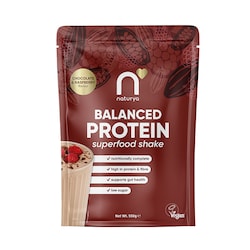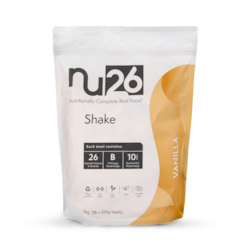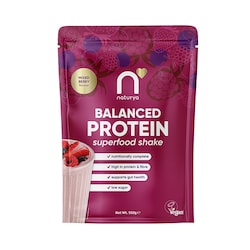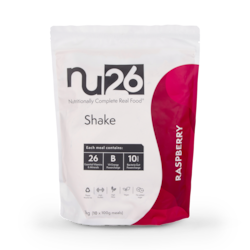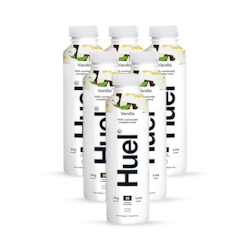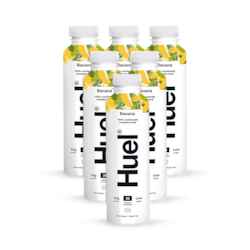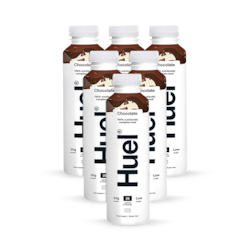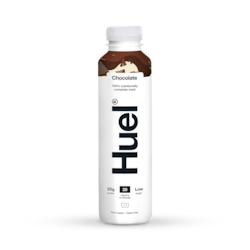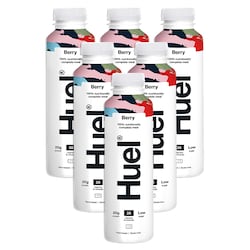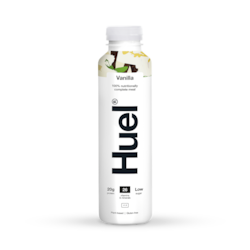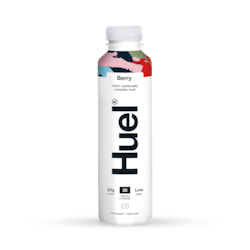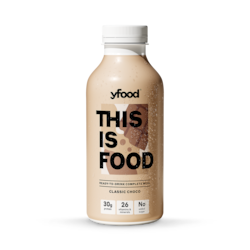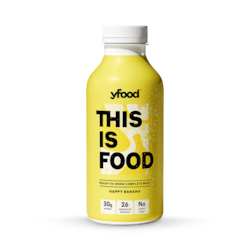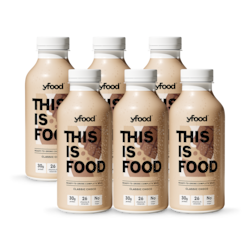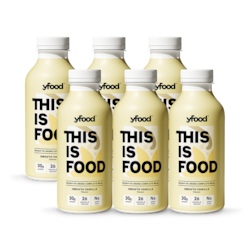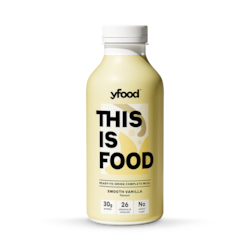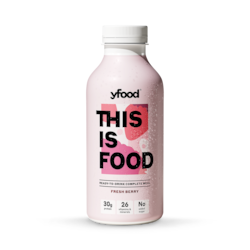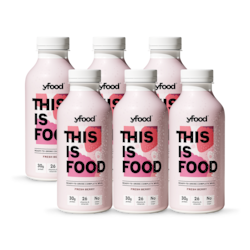15% off £20
Code:TREAT
23 ways to increase your appetite explained
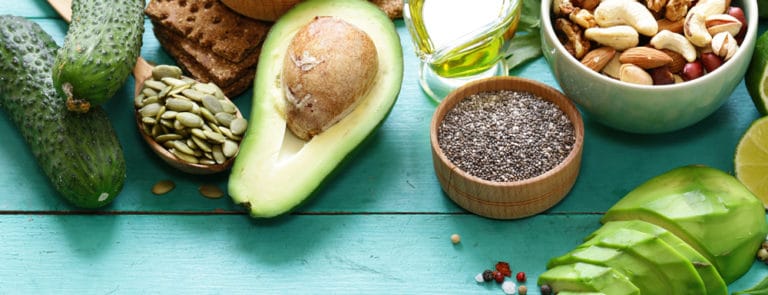
Loss of appetite lowering your energy levels or got you losing weight? Here are 23 tips and tricks you can use to increase your appetite.
Summary
1What causes a loss of appetite?
Some illnesses can put us off eating, such as an overactive thyroid or an inflammatory condition like rheumatoid arthritis. Many people lose the...
2How to get your appetite back
Did you used to have a huge appetite and now can’t seem to match it? One of the best ways to get back on the hungry train is to find out what’s...
3How to increase your appetite
If your loss of appetite is sudden and unexplained, and you’re losing weight, see your GP. Likewise, if it’s ongoing and none of the following...
Struggling to eat enough? Worried it’s affecting your health? Try these tricks to get your appetite back on track.
Feeling less hungry during hot weather, or because you overindulged the day before, is perfectly normal. But losing your appetite long-term could affect your wellbeing, and even cause weight loss and malnutrition.
Not to mention the muscle gains and fitness goals in reach when you can increase your appetite and food consumption.
Our bodies start to panic when we don’t feed them enough of the nutrients we need, e.g. carbs for energy, protein for muscle recovery, and healthy fats for energy, cell growth and warmth – to name a few!
However, we understand that it’s not as simple as forcing yourself to eat when you don’t want to. That’s why we’ve put together these 23 ways to help get you feeling hungry again!
What causes a loss of appetite?
Some illnesses can put us off eating, such as an overactive thyroid or an inflammatory condition like rheumatoid arthritis. Many people lose the desire to eat when they’re stressed, anxious or depressed.1
We also become less interested in food as we get older – we’re less active and lose muscle, so we don’t need as many calories.2
How to get your appetite back
Did you used to have a huge appetite and now can’t seem to match it?
One of the best ways to get back on the hungry train is to find out what’s causing this decrease in appetite and put things into place to turn it into an appetite increase.
A decrease in appetite can be due to many factors, including:
- Stress
- Anxiety
- Depression
- Age
- Less frequent exercise
- Lifestyle changes
- Weight loss
- Antibiotics
- Chemotherapy
- Codeine
- Morphine
- Cold/Flu
And some conditions like:
- Anorexia
- IBS
- Pregnancy
- Heart failure
- Kidney failure
- HIV
- Dementia
Can you gain appetite fast?
It depends on what is causing you lack of appetite, if it is because of a cold then sure! Your appetite could come back almost immediately. However, if your loss of appetite is due to a serious condition, then it is unlikely to spring back right away.
Summary
- Maintaining a healthy appetite should be easy, but often isn’t, with lots of people suffering from both over and under-eating
- There are lots of reasons your appetite may lower, including stress, illness, lifestyle, as well as serious medical conditions like anorexia
How to increase your appetite
If your loss of appetite is sudden and unexplained, and you’re losing weight, see your GP.3 Likewise, if it’s ongoing and none of the following ideas seem to help…
1. Eat more meals
Go for 6-8 small meals a day, not three large ones. Eating less food, more frequently, can help you to consume more overall.4
Although, if you are most hungry in the morning and know you rarely feel peckish in the evening, then take advantage of that and eat most of your small meals when you are most hungry.
2. Get with the schedule
Our bodies generally love a routine.
Try to eat meals and snacks at set scheduled times, whatever that looks like for you. For example, you could commit to having:
- Breakfast at 8am
- A midmorning snack at 11am
- Lunch at 1pm
- Mid-afternoon snack at 3pm
- Dinner at 6pm
- Supper at 8pm
3. Choose nutrient-rich
Yes, junk foods like crisps, cakes or pastries are high in calories, but they’re also low on nutrients.
Seek out healthy fats, protein and slower-release carbohydrates instead:5
- Full-fat natural or Greek yoghurt with berries instead of ice cream
- Nuts and seeds, not crisps
- Malted fruit loaf rather than cake

4. Choose foods you enjoy
Although eating a healthy balanced diet is important, so is actually liking the food in front of you.
Always choose meals and snacks that you genuinely enjoy and like the smell of. Even if that means repetitively eating a plain-yet-satisfying vegetable pasta bake for a few days or similar.
The important thing is that you eat and get that appetite going again.
5. Experiment with your food
One reason for a low appetite that is usually overlooked is being bored of the foods you are eating.
Whether you have got stuck in a rut and go through the same few meals week after week or always choose the easy (yet boring!) option, it may be time to shake things up a little.
Introducing new cuisines, you haven’t tried before and just generally being open to new dishes and snacks could reignite your appetite in a big way.
Here are some recipes that could help get your appetite back on track:
- 10-step falafel
- Grilled asparagus & shitake mushroom tacos
- Caramelised onion dhal
- Thai tofu laksa
- Vegan Caesar salad with kale & avocado
- Kimchi poke bowl
- Healthy recipes with 5 ingredients or less
- Vegan Philly cheesesteak
- Black bean burger with guacamole and chipotle mayo
- Butternut squash Moroccan salad with couscous and chickpeas
- Vegan macaroni cheese with a chilli and garlic crumb topping
6. Embrace the change
Used to love cheese but now can’t bear to be in the same room as it? Perhaps you used to hate garlic but now can’t get enough of it?
Tastes and cravings can change from time to time, and the best thing you can do is go with the flow and accept that you don’t want to eat these certain foods anymore.
It’s better than forcing them down just out of habit or convenience.
7. Certain foods need to chill out
Some foods like meat, dairy, puddings, custards, egg salads and fish may taste better at room temperature.
Try taking them out of the fridge and let them warm to room temperature – make sure you eat them within an hour of taking them out of the fridge, though.
8. Plan meals and prepare in advance
Try to get a meal plan going for the week (or month!) so that you don’t lapse into bad habits like not eating or just eating snacks instead of a healthy meal.

Sundays (or whichever your day off it) is a good day to choose some easy, tasty meals to make in bulk for the day ahead.
You can always freeze some for later in the week, so you’re never caught short without an easy meal to access.
If you’re struggling to meal plan, here is a 7 Day Vegan/Vegetarian Meal Plan For Weight Gain.
9. Fortify with healthy fats
Fat contains the most calories of any food source, but up your intake with healthy fats rather than too many animal or trans-fats:6
- Spread nut butters onto fruit
- Add full-fat yoghurt to fruit, porridge or muesli
- Drizzle olive oil over salads and veg
- Add avocados nuts and seeds to salads and sandwiches
- Cook with coconut oil
By upping your healthy fats, your meals will probably taste the same – if not better, making this one of the easiest ways to make the most of your mealtimes.
Handpicked content: Is it all about healthy fats now?
10. Don’t drink with meals
Drinking a glass of water before or during a meal is a well-known weight loss trick, making you feel fuller – the exact opposite of what you need!7
Try not drinking water 30 minutes before a meal to see if you are more hungry / eat more.
11. Don’t get distracted
When you are watching the TV, scrolling on your phone or any other distracting activity while you eat, the focus gets taken away from the food.
For some people this is good, a distraction helps them to forget they are actually eating, but for others it could be too much of a good thing.
If you get distracted while eating:
- Your food could get cold / warm and put you off it
- You could be put off your food (you see something gross on TV)
- You could get too distracted and stop eating all together
Test it for you: sit at a table with no distractions and simply eat, focusing on the flavours and textures. You may just find it works wonders for your appetite.
12. Get plenty of rest
Making sure you are sleeping well and getting enough rest could be key to ramping up your appetite.

When we don’t get enough sleep, our bodies can easily become stressed – and for some people, this means ignoring hunger cues due to anxiety and eating less.8
Tiredness throughout the day can also squash any motivation to make healthy, filling meals, and you may find yourself snacking on junk, ordering junk food, or avoiding eating all together.
So, make sure you get enough sleep – which is usually 7-9 hours for your average adult.
13. Start early
Studies show eating breakfast can kick-start metabolism, increasing your appetite throughout the day.9
Many people feel hungriest first thing, so that’s a good time to get higher-calorie foods in.10
Here are some ideas for nutritious and high-calorie breakfasts:
- Vegan breakfast muffin
- Porridge (add nut butters, chia seeds, chocolate, syrups, nuts, fruits, etc.)
- Vegan breakfast omelette
- Eggs / avocado on toast
- Vegan fry-up
- Beans on toast
- Vegan huevos rancheros
- Vegan dark chocolate & pecan granola
- Manuka honey pancakes
If you usually skip breakfast because you’re in a rush, try getting up a little earlier and give yourself time to wake up before you go to work.
You may feel strange getting up an hour or two before you usually leave the house, but this allows your body to actually wake up and start to feel hungry naturally.
Doing some yoga or light exercise during this time could also get your appetite flowing – as well as help set you up for a wonderful day.
14. Use herbs and spices
As well as helping your food taste divine, carminative herbs reduce the gas production and bloating that can put you off eating.
These appetite-aiding herbs and spices include: fennel, peppermint, black pepper, coriander, mint, ginger and cinnamon.11
Try using them in recipes or making them into a tea to see if they can help pep up your appetite.
They could even start to work before you’ve scoffed them down too. Cooking with aromatic herbs and spices can help trigger your appetite – just like when you walk through a shopping centre and smell the bakery or fast food restaurants, except in your own kitchen!
As they are so pungent, the hunger-inducing aromas may just get your mouth watering.12
Bitter tonics, such as gentian, can also stimulate appetite and digestive-enzyme production.13
15. Try meal-replacement drinks
If you’re really struggling to eat, you might find it easier to sip on a specially formulated shake, or you can make your own.
This way you get the nutrients and calories you need (if you pick a good shake) in minutes.
You can even take the powder in a shaker into work and enjoy it as a snack or meal if you find that you eat less at work due to time constraints, etc.
Avoid ‘diet’ or ‘lean’ replacement drinks though, as they will have less calories and may contain ingredients that make you feel fuller – and we don’t want that!
If you want to make your own:
- Blend up some fruit and veg, then add in protein powders, oats, seeds, nut butters, yoghurt or tofu for extra calories, vitamins and minerals.14

16. Move more
Exercise is known to boost hunger – the more energy you burn, the more your body will crave.
Regular exercise has been shown to increase metabolism and muscle mass, and influences the hormones that increase appetite.15
Try going for a short walk or exercise lightly before meals to see if it helps get you hungry.
Once you find an exercise you enjoy doing, your body should adapt and life your appetite, think of it as a kickstart. Here are some easy and accessible exercises you could try:
- Yoga
- Pilates
- Dancing
- Running
- Walking
- Badminton
- Tennis
- Hiking
- Football
- Netball
- Tabata
- HIIT training
- Weight training
- Cycling
- Hula hooping
- Gymnastics
- Swimming
Handpicked content: 19 ways to fit exercise into your daily routine
17. Leave snacks around
Fill some bowls with healthy snacks and place them in frequently-used areas of the home to encourage you to snack healthily between your meals.
You could use:
- Almonds
- Grapes
- Tangerines
- Peanuts
- Pistachios
- Biscuits
- Wasabi peas
- Popcorn
This way, it will never feel like a big effort to eat and you won’t even need to leave the room!
18. Present your meals attractively
One of the most important senses associated with our appetite is vision; if something looks bad then we are less likely to want to eat it, even if we know it tastes good.
Quite contrary to the idea of ‘it’s what’s on the inside that counts!’.
When humans were hunter-gatherers, our vision played a big part in what we would eat. For example, when our ancestors were looking for food, our eyes were the most important part of choosing foods that are safe and nutritious to consume.
Although a lot of us eat very differently now, this instinct is still present.16
Try taking a few minutes at mealtimes to arrange your food in an aesthetically pleasing way with garnishes like sauces, lemon/lime wedges.
Varying the colours on the plate can help a lot too, so take that into consideration when you’re meal planning.
19. Enhance the ambiance at mealtimes
The environment you’re in when eating a meal can make a difference in how much you eat. That’s why it can be a good idea to make mealtimes a bit more special with little touches like:
- Laying the table with your nicest tableware
- Lighting a candle and pretending you’re in a restaurant
- Putting on your favourite film or TV show
- Playing relaxing music

20. Get a bigger plate
Serving up small portions on big plates may cause the amount of food to appear less overwhelming and help you to finish it.
If smaller portions just don’t do it for you, using a bigger plate for larger portions could also help.
A review of 72 studies found that people consistently consume more food and drink when offered larger-sized portions, packaged or tableware than when offered smaller-sized versions.17
21. Up your nutrient intake
If you’re not eating enough, you could have lower levels of certain vitamins and minerals, which may affect your appetite.
Consider supplementing with zinc, vitamin B1 and fish oils, which have all been found to help stimulate appetite.18,19,20
22. Tackle stress
Stress typically affects the appetite in 2 ways; some people find comfort in food when they are stressed whereas others will be totally put off food.
Those who stop eating are so preoccupied with their stress that they don’t listen or ‘tune into’ their body’s hunger cues, whereas those who overeat use food as a distraction.21
Either way, it’s clearly better for your appetite – and general wellbeing, to try and confront your stressors. To help reduce your stress levels, try these tips:22
- Take regular, gentle activity
- Practice some breathing exercises
- Prioritise your sleep
- Yoga or mindfulness meditation
- Consider supplements and vitamins that increase appetite, like zinc, vitamin B1 and fish oils23,24,25
23. Try nutritionally complete foods
If you don’t supply your body with the macronutrients and micronutrients it needs to function at its best, it may have a knock-on effect on your appetite.
However, we know life sometimes gets in the way of preparing and cooking healthy, balanced meals, and this is where nutritionally complete foods can step in.
Nutritionally complete foods provide essential carbohydrates, protein, fats, vitamins, and minerals your body needs for optimum health.
You can choose from powders, bars, and ready-made drinks to enjoy a nutritionally complete meal that requires no prep.
They can be a great way to kick-start a healthy appetite, especially if you have a busy schedule or like to eat on the go.
Summary
There are a lot of things you can try to increase your appetite, from sticking to a meal schedule and presenting your meals attractively to partaking in regular exercise and getting plenty of rest
The advice in this article is for information only and should not replace medical care. Please check with your GP or healthcare professional before trying any supplements, treatments or remedies. Food supplements must not be used as a substitute for a varied and balanced diet and a healthy lifestyle.
Last updated: 18 January 2022
http://kent.healthhelpnow.nhs.uk/health-help/advice/older-adult/healthy-eating/unintentional-weight-loss-loss-of-appetite-and-eating-a-balanced-diet/
http://kent.healthhelpnow.nhs.uk/health-help/advice/older-adult/healthy-eating/unintentional-weight-loss-loss-of-appetite-and-eating-a-balanced-diet/
http://kent.healthhelpnow.nhs.uk/health-help/advice/older-adult/healthy-eating/unintentional-weight-loss-loss-of-appetite-and-eating-a-balanced-diet/
https://www.royalmarsden.nhs.uk/your-care/living-and-beyond-cancer/eating-well/poor-appetite-losing-weight
https://www.royalmarsden.nhs.uk/your-care/living-and-beyond-cancer/eating-well/poor-appetite-losing-weight
https://www.royalmarsden.nhs.uk/your-care/living-and-beyond-cancer/eating-well/poor-appetite-losing-weight
https://www.ncbi.nlm.nih.gov/pubmed/20796216
https://www.cureus.com/articles/13630-neurohormonal-regulation-of-appetite-and-its-relationship-with-stress-a-mini-literature-review
https://www.ncbi.nlm.nih.gov/pubmed/24898233
https://www.royalmarsden.nhs.uk/your-care/living-and-beyond-cancer/eating-well/poor-appetite-losing-weight
https://www.ncbi.nlm.nih.gov/pmc/articles/PMC4893422/
https://www.ncbi.nlm.nih.gov/pubmed/14513063
https://www.ncbi.nlm.nih.gov/pubmed/25529701
https://www.westsuffolkccg.nhs.uk/wp-content/uploads/2013/08/Food-First-Advice-WSCCG-logo.pdf
https://www.ncbi.nlm.nih.gov/pubmed/25614205
https://www.sciencedirect.com/science/article/pii/S0278262615300178
https://www.cochranelibrary.com/cdsr/doi/10.1002/14651858.CD011045.pub2/full
https://www.ncbi.nlm.nih.gov/pubmed/21846317
https://www.ncbi.nlm.nih.gov/pubmed/24607345
https://www.ncbi.nlm.nih.gov/pubmed/23474089
https://www.cureus.com/articles/13630-neurohormonal-regulation-of-appetite-and-its-relationship-with-stress-a-mini-literature-review
https://www.nhs.uk/conditions/stress-anxiety-depression/understanding-stress/#how-to-tackle-stress
https://www.ncbi.nlm.nih.gov/pubmed/21846317
https://www.ncbi.nlm.nih.gov/pubmed/24607345
https://www.ncbi.nlm.nih.gov/pubmed/23474089


